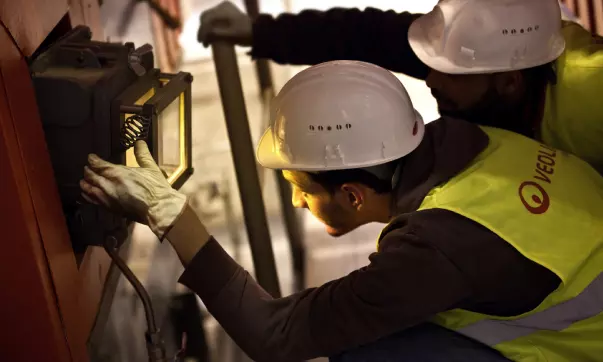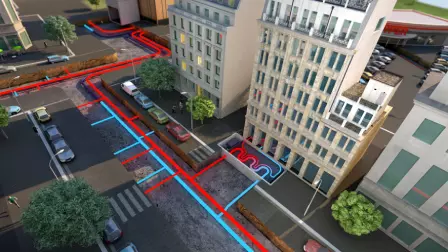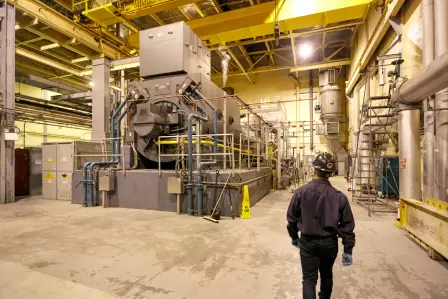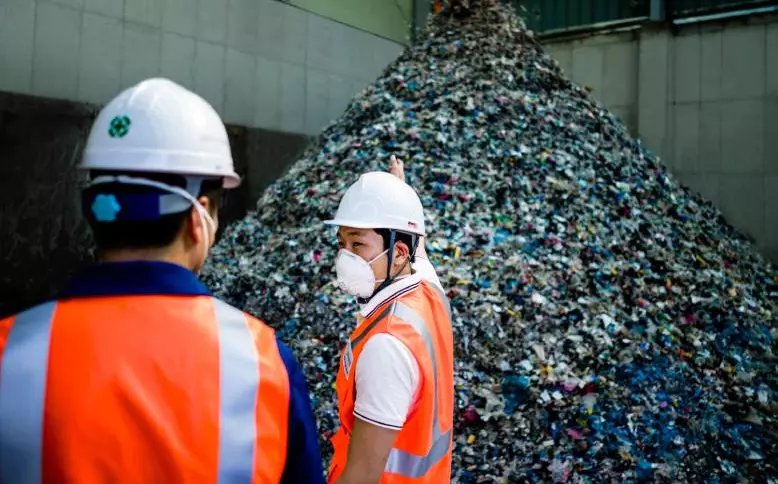The energy transition and the fight against climate change require us to rethink our methods of energy production and distribution. Communities and industries are seeking local, sustainable, and economical solutions to meet their energy needs. Veolia, with its expertise in resource management and its commitment to decarbonization and the circular economy, is ideally positioned to meet these challenges. Veolia, with its expertise in resource management and its commitment to decarbonization and the circular economy, is ideally positioned to meet these challenges. Our integrated approach combines the optimization of existing infrastructure, the valorization of local resources, and the deployment of innovative technologies. We design and implement tailor-made solutions that ensure supply security, reduce carbon footprint, and control costs, all while adapting to the specificities of each territory.
Our solutions for local energy
We support municipalities and industrial companies in the local energy production and distribution. Discover our solutions.

Heating and cooling networks for the territories
The Veolia difference
- You comply with environmental regulations
- You secure your energy supply
- You reduce your environmental footprint
- You decrease your energy costs
- You diversify your energy mix and reduce your dependence on fossil fuels
- You reduce waste volumes

Learn more about local energy
Our solutions for local energy production and distribution:
Heating and cooling networks for the territories
Veolia develops and operates innovative district heating and cooling networks to meet today's energy and climate challenges. Our solutions use decarbonated, local and affordable energies, adapted to the growing needs of cities and industries. By harnessing local resources such as biomass, geothermal energy and waste heat, we significantly reduce CO2 emissions while ensuring optimum energy performance. Our 5th generation networks, like the one in Paris-Saclay, even enable buildings to be both energy producers and consumers, offering unprecedented flexibility.

Veolia designs, builds and operates innovative cogeneration infrastructures, providing an effective solution to meet the energy challenges of territories. Our production units combine energy efficiency, supply security and reduction of CO2 emissions. By simultaneously producing heat and electricity, our facilities achieve higher performance than conventional systems, generating significant energy savings. Tailored to the specific needs of each client, our turnkey solutions ensure optimal energy performance for municipalities, industries and public institutions.

The transformation of sewage sludge into green energy makes a significant contribution to the ecological tranformation. Thanks to our anaerobic digestion technology, we produce biogas, which we can then purify to obtain 99.5% pure biomethane, directly injectable into the public distribution network. This innovative solution offers communities and industries a sustainable alternative to fossil fuels, while promoting their energy independence. Fully automated and resource-efficient, our approach adapts to all types of organic sludge.
Veolia is committed to the complete recovery of biomass, from collection to transformation into energy or materials. Our expertise covers four types of biomass: forestry, agriculture, food processing and wood processing. We offer innovative solutions for producing renewable energy, thereby contributing to the energy transition and the preservation of resources. With over 500 references worldwide, we help manufacturers and local authorities reduce their dependence on fossil fuels and secure their energy supplies.
At Veolia, we transform household waste into green energy to reduce the use of fossil fuels and promote the circular economy. Thanks to our waste-to-energy plants, we produce heat for district heating networks and electricity to supply homes or the public grid. Faced with increasingly stringent regulations, our sustainable approach to waste-to-energy is a key solution. With over 60 units worldwide, we help municipalities to treat waste responsibly.
Veolia converts biogas from its landfills into renewable energy, helping to reduce the climatic impact of methane, a more potent greenhouse gas than CO2. Thanks to high-performance collection and pre-treatment systems, we recover more than 14 million tonnes of landfill waste every year, producing 1.2 million MWh of electricity. Our approach includes site design, construction, operation and post-operations, guaranteeing efficient and sustainable biogas management.
Veolia develops innovative solutions for transforming non-recyclable waste into Solid Recovered Fuel (SRF), offering a sustainable alternative to landfill and reducing the use of fossil fuels. Our SRF preparation and incineration units convert waste into heat and electricity, meeting the growing demand from industrial companies across Europe. By integrating these processes on sorting sites, we help to create jobs while supporting the energy transition to greener sources.

Microgrids: The solution to energy resilience
The microgrid solutions that we offer enable energy to be produced, stored and distributed in a resilient and sustainable way. These smart microgrids help cities, industries and service sectors to secure their energy supply, save money and reduce their environmental footprint. Using mainly renewable energies, our microgrids operate independently or as a complement to the main grids, ensuring continuity of essential services in the face of climatic hazards and other threats.









